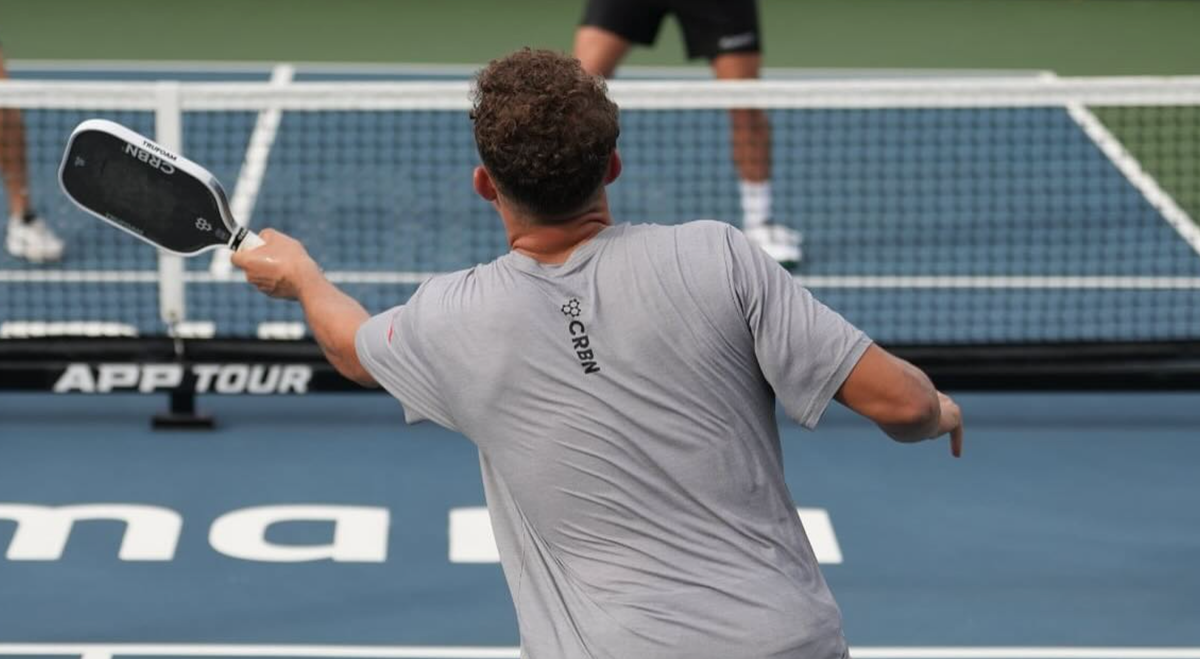Pickleball was created as a fun and highly social paddle sport originally meant to stave off boredom on a family trip. It's come a long way since its inception, but those who play the game today still understand this. But it's not all niceties, and sometimes you need to champion the competitor inside, which requires playing more aggressively when the time is right. And there's one shot in pickleball that's earned the reputation of being the most aggressive.
The overhead smash is the most aggressive shot in pickleball. An overhead shot is completed when the player hits the ball from a high contact point and then downward from an extended arm above the head. The overhead smash is typically a return of a lob, which is a shot where the player hits the ball high into the air and serves deep.
In this article, we will go over how to properly perform an overhead smash, when to use it versus other shots, and how to increase your power as a player. The game of pickleball can be relaxed for some, but others understand there’s nothing wrong with playing with power behind the paddle.
What Makes the Overhead Smash Aggressive?
The overhead smash in pickleball is aggressive due to its power, speed, and downward angle. The shot capitalizes on high, weak returns from opponents, enabling players to hit the ball with full force. This forceful shot puts pressure on opponents, increasing the likelihood of an unforced error.
The overhead smash sounds pretty tough already, but what does it mean to play aggressively? Playing aggressively in pickleball is when a player knows their opponent's weakness and uses it against them. It doesn’t mean hitting the ball deep every return of serve – it’s about being intentional with your shots. Playing aggressively might include a strategy like preventing your opponent no chance to get close to the kitchen.
The overhead smash is a great shot to bring this strategy to life when the opportunity presents itself. At the heart of the aggressive nature of an overhead smash is physics - it's the most aggressive shot because the ball travels faster when it has a high point of contact and body momentum for power.
Pickleball Terminology To Know
Before we go much further in the world of overhead smashes, it makes sense to get a few building blocks out of the way. We'll be referring to some pickleball slang as we explain the best way to hit an overhead smash. And without the right context, parts of this can sound obscure or worse, unhelpful. Even if you already know the terms, it’s always good to review the lingo.
| Also known as the overhead slam, the overhead smash is a powerful downward shot. It is usually performed after a lob. | The section before the net, and is also called the non-volley zone. | A return shot that forces the opponent to the baseline. It is hit high in the air and returns the ball deep into the opposing side of the court. | A deep shot means hitting the ball near the baseline. This can be done when serving or returning the ball to your opponent, known as a return of serve. | Any shot where the ball makes contact with the paddle over the head. |
With the glossary behind us, let's examine the movements of successfully smashing a pickleball.
The Mechanics of the Overhead Smash
The overhead smash is as technical as it is aggressive. Getting this shot right, takes time, practice, and an understanding of the basics. If you want to hit an unreturnable smash every time, there are three parts to keep in mind with this shot: your body, your foot placement, and the overall execution.
Proper Body Positioning
Like any stroke, your stance and body position is instrumental. Pickleball players start an overhead smash in the athletic stance. An athletic stance is when the player’s hips are bent forward and the feet are parallel and at shoulder-width. The arms and the paddle are held in front at chest height.
The truth is, once a ball is served, you should be in a ready athletic stance, regardless of what your next shot is going to be. It will make you far better prepared for whatever shot is coming at you. A proper starting position puts a pickleball player at an advantage against their opponent. This athletic stance allows a player to have easy access to any direction when the opponent serves the ball.
Importance of Footwork
Foot placement is critical to making this shot powerful. Your feet will start in a neutral position, but your first step will be back with your dominant foot - this should be the same side as your dominant hand (the one holding the paddle.)
For example, if a player is right-handed, they would step back with their right foot. To keep foot traffic light and easy, keep your legs bent while in an athletic stance.
With your dominant foot back, angle your body perpendicular to the net. Keep the hand with the paddle behind your head with elbows bent, and the opposite hand angled upward towards the incoming ball for spotting - this is a key way to make sure you're tracking the ball accurately as it makes its way within reach.
Once you complete the shot, don’t be afraid to keep your feet moving. It’s a common mistake that players can make, leaving them to miss the ball and lose a point.
Execution of the Shot
The technique is important to the overhead smash because it determines if your shot will be strong or weak. With the paddle behind your head, ensure to fully extend it when making contact with the ball. The pros often try to move the paddle from their shoulders instead of their elbows. This increases a player's power on their shots.
Let's string all of this together to see the 4 steps of hitting an overhead smash:
How To Perform an Overhead Smash
- Step 1: Begin in an athletic stance
- Step 2: Bring the dominant foot and dominant arm back, holding the paddle behind your head
- Step 3: Extend the opposite arm in the direction of the ball to track it
- Step 4: Hit the ball downwards and over the net
What Is the Best Grip for the Overhead Smash?
The best grip for the overhead smash in pickleball is the continental grip. The continental grip is performed when players hold a paddle like a hammer. This position is best for backhanded, overhead, and deep serves. The eastern grip can also be used but does not give the same power.
While there are three main grips that players use in pickleball: the eastern, western, and continental grip, the continental grip is a great choice for overhead smashes. The eastern grip allows a player to hit forehands and backhands. It is the most popular grip because it is the most natural to the hand. The western grip works for topspins and improves forehand shots, but is weak for backhanded shots.
2 Common Mistakes to Avoid
There are two major mistakes that players make when trying to overhead smash - first, they lose their balance which sends the ball way off target. Second, adrenaline takes control and players lose any figment of composure. Let's look at both situations in a bit more detail and see what you can do about either scenario.
1. Becoming Off-Balanced
Maintaining control during overhead shots can be challenging. If you find yourself off-balance, your first job should be adapting your stance as quickly as possible. Begin by pivoting your dominant foot parallel to give you strength and control and reclaim your balance, stability, and command.
Don't hesitate to reposition as the ball travels across the court. But once you know where the ball is going, you need to make sure you pivot for balance before swinging. This will help you maintain control and increase your power.
2. Leaning To The End of the Court
If your opponent is playing aggressively and constantly pushing you to the baseline, don’t sweat it. To regain control and get back into the game, think of your movement in a longer-term progression, one where you move closer to the kitchen line in increments throughout a rally. This is the hallmark movement of a split-step, which could be a great tactic to use here as well.
Try to handle this with as much patience as possible, constantly observing your opponent and looking for a weakness to show itself.
Is the Overhead Smash a High-Risk Shot?
Yes, the overhead smash is a high-risk shot in pickleball. When not given enough power, the ball can land midcourt and not pass the net. When given too much power, the ball can go out of control and leave the court boundaries. Practicing drills are key to using the overhead smash correctly.
While the overhead shot can be powerful when done right, it can cause you to lose the rally when done wrong. There is a lot of power behind your body’s momentum, so if you are out of control, the overhead smash can cause the ball to go out of bounds.
What Is the Difference Between Banging and Playing Aggressively in Pickleball?
Banging in pickleball refers to constantly hitting hard, low-percentage shots, while playing aggressively emphasizes strategic shot selection and pressure. Aggressive players focus on positioning and smart attacks, using a variety of shots to dictate the game and exploit opponents' weaknesses.
A banger hits the ball hard consistently because they lack the technique to slow the game down. They rarely use an overhead smash or lob. Banging is looked down on in the pickleball community. This is because there is no flow or change of pace to the game. The pickleball ball travels easily, and there is no need to use all your strength for every shot unless necessary.
Playing aggressively sees the weakness of an opponent and chooses their shots carefully. They are not afraid to slow down the game. The change of pace and intentional choice of shots is part of the culture of pickleball. Remember, if a player has control of the game’s pace, they are playing aggressively.
The Overhead Smash in Action
An overhead smash is a powerful tool for pickleball players. However, this shot does not work in every situation. When is the best time to use the overhead smash and how can you get better?
When to Use It:
Use the overhead smash when your opponent sends a high ball your way. If your opponent messes up and pops the ball up, this is a fantastic shot back. This powerful shot can help you score points and take control of the game. Just make sure to hit the ball at the right time, or you might miss your chance.
Court Position:
Stand close to the no-volley zone or a little bit behind it to get ready for the overhead smash. Keep your feet apart and bend your knees a little for balance. As the ball comes towards you, turn your body and shift your weight from your back foot to your front foot while you hit the ball.
Intimidation Factor:
A great overhead smash can make your opponent nervous. It shows them that you're skilled and can take charge of the game. But remember, it's essential to use different shots too, so your opponent doesn't know what to expect.
What Is the Difference Between the Overhead Smash and the Forehand Smash?
The overhead smash and forehand smash differ in technique and power. Overhead smashes are executed above the head with maximum force, while forehand smashes involve a strong, controlled swing from the side, a drive. Both shots require precision and timing for optimal results.
A forehand smash is best used when the player is close to the baseline and far from the kitchen. It is a good shot to use when a player is unsure if the ball will hit the center of their paddle. It is a less offensive shot than the overhead, but the forehand smash can be just as deadly when performed correctly.
3 Advanced Techniques for the Overhead Smash
The overhead smash is a great asset to your game if you know how to use it right. Fortunately, there is still more you can add to your overhead smash to improve the strength of your shot.
1. Topspin and Backspin
The topspin is the forward rotation of the pickleball. Topspin gives a Magnus effect which causes the ball to dramatically sip sooner than if the ball was flat. Professional pickleball players use this to their advantage. If you can clear the net with your overhead shot and add a topspin, you can catch your opponent off-guard.
To create a topspin, hit the ball with an upward motion of the paddle on the back of the ball. This will cause the ball to rotate forward. Using a topspin will give a player more aggressive lobs and greater heights.
The backspin is the backward rotation of the pickleball. It is also known as the slice. Because the ball is rotating toward the player, a backspin is slower than a topspin. This is a technique to use when you are trying to slow the pace of the game or the opponent is banging.
2. Switching Grips
While the continental grip is recommended for the most aggressive shots in pickleball, it is good to switch it up. Doing so can alter the pace of your game and reduce the intensity. Again, controlling the pace of the game is a way to play aggressively.
The eastern grip is an easy and natural substitute for the powerful continental grip. The Western grip is better for backhanded shots and can be beneficial for the player if the game’s pace needs to slow down.
3. Be Sure to Follow Through!
Many beginners don’t feel confident when they first use an overhead shot in the heat of a game. Because of this, they may not extend their arm all the way and follow through, giving them less power behind the paddle.
Advanced players understand the balance between confidence and the right time to use the overhead smash. So when they do the shot, they follow through. Whether you’re an unsure beginner or a pro that knows it, it’s best to follow through with the overhead shot than risk the ball falling in the center of the court thanks to bending elbows.
How Can I Increase the Power of My Overhead Smash?
Flicking your wrist is one way to increase the power of an overhead smash. It is also recommended to spot the ball with the opposite hand to track where to place your paddle. Additionally, using a fully extended shoulder when making contact will increase the strength of the shot.
Extending the arm, flicking your wrist, and using the momentum of your body weight can help you get the most aggressive shot of the whole game. Thanks to the downward momentum of your body weight, the pickleball will travel faster than with just the strength of your arm.
The Mental Game of the Overhead Smash
Pickleball is just as much of a mental game as it is a physical one, and the best pickleball players can balance this game of body and mind with ease. How can those learning pickleball build their confidence, manage nerves, and use visualization to prepare for the game?
Consistent practice is how professional pickleball players improve their confidence. When players use the court in their free time, the likelihood of success and proper technique used increases. This is due to muscle memory. The more successful players can track, the more their confidence rises.
But playing a game just for fun is completely different when you’re in a competition mindset. As the game gets to its turning point, players want the element of surprise up their sleeves. Can they do it correctly under a moment of pressure just as well as they did in practice? What mental loops do a pickleball player need to conquer to play relaxed?
Reducing urgency mid-game helps players relax in high-pressure situations. This means being deliberate in your strokes and only using excess strength when necessary. If an opponent is serving deep, relax and serve deep when you see your opponent's weakness.
Remember, pickleball is a low-impact sport. This is why so many people love it! If your opponent is serving deep and pushes you right before the baseline, understand that it is better to incrementally inch to the kitchen and perform the overhead smash when you are ready. Putting excess force into an overhead smash when you are not close enough to the kitchen can result in the ball not passing the net. But players can still improve their confidence before stepping on the court. When visualizing their success before a game, studies have shown that players feel more confident and perform better than without positive visualization.
Smash It with the Right Paddle
The overhead smash is the most powerful shot of the game! Even though pickleball is a low-impact sport, there is still the power behind the ball with the right technique. But those overhead shots don’t come easily. However, if a player has time to practice, proper technique, and the right paddle, the overhead slam can be added to your toolbelt of skills as a player.
We understand the importance of having the right paddle to achieve that perfect overhead smash. Be sure to check out our inventory of high-quality paddles to find the right fit for you.
Anuncie Aqui / Advertise Here
Sua marca para o mundo Pickleball! / Your brand for the Pickleball world!

 English
English  Spanish
Spanish  Portuguese
Portuguese  German
German  Italian
Italian  Japanese
Japanese  French
French  Polish
Polish  Russian
Russian  Netherlands
Netherlands  Hungarian
Hungarian  Turkish
Turkish  Videos
Videos 








 English (US) ·
English (US) ·  Portuguese (BR) ·
Portuguese (BR) ·